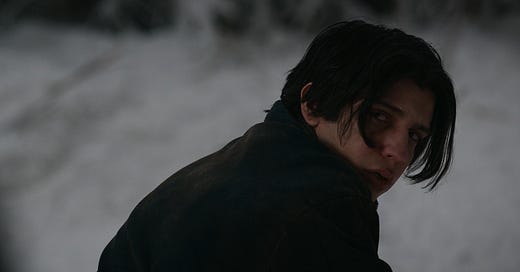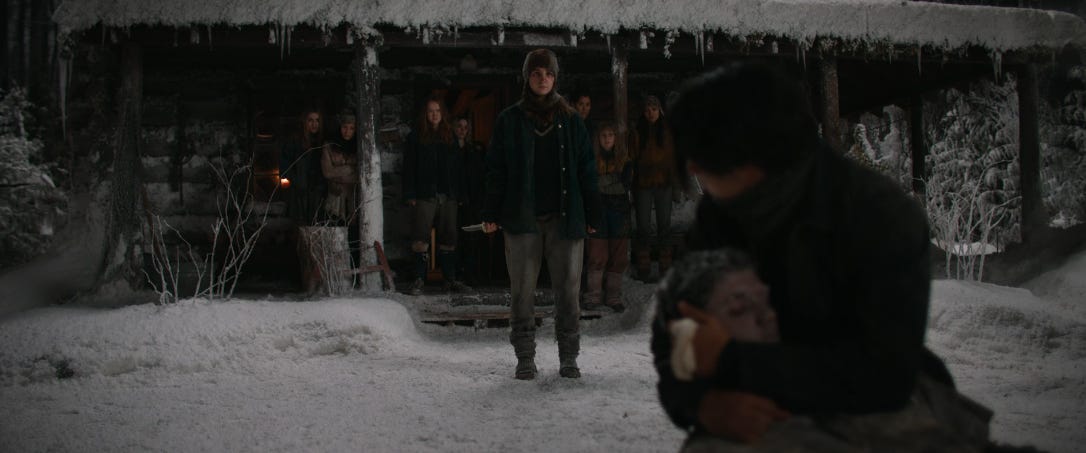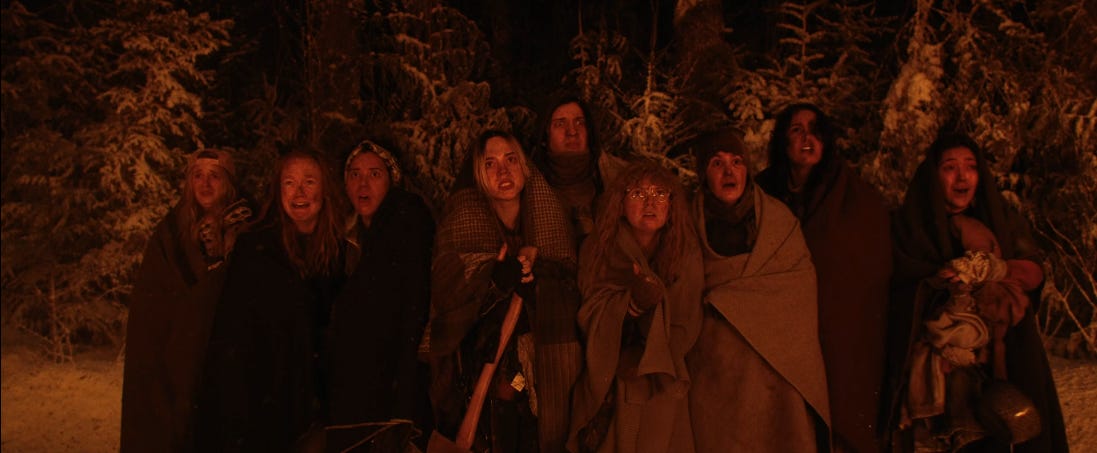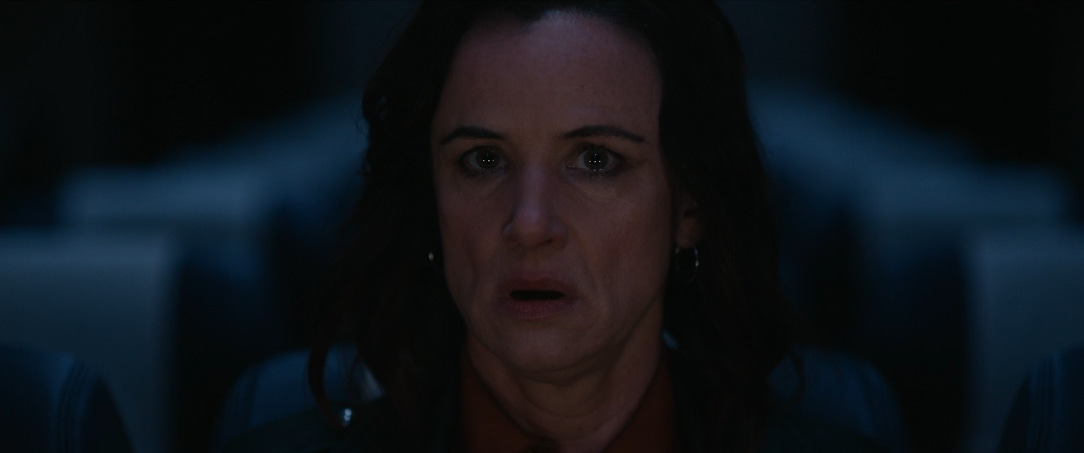Review: Yellowjackets, “Storytelling” | Season 2, Episode 9
A wobbly finale has its moments but doesn’t stick the landing
It’s no secret that the second season of Yellowjackets has struggled compared to the first, for a lot of reasons. And yet while this season won’t crack my top ten at the end of 2023, I still have a strong attachment to the show as a whole. I still care deeply about (most of) these characters, which makes it even more frustrating when the writers fail to keep them consistent over time. So while the wait for season three might not be as difficult to handle as the wait for season two was, I still look forward to its return, and I’m curious about how the next few seasons will shake out, on both a plot and character level.
That said, my experience of watching “Storytelling” didn’t differ much from my experience watching most of this season. There are parts of this finale that work—the same parts that have always worked, really—and there are parts that don’t, especially in retrospect.
As in the season one finale, the majority of wilderness scenes in this episode deal more with emotional fallout than action, following an intense penultimate episode. This is something Yellowjackets always handles well: the slow march to a tragic inevitability, which in this case means everyone eating Javi. Travis hasn’t had a ton of material this season, but it’s still painful to watch him grapple with what his friends have done to his brother—and what makes it so fascinating is that beyond a few weak protestations he really can’t argue with any of it. Javi is what will keep all of them alive a little longer, including Travis himself, and refusing to eat his brother would mean wasting a sacrifice. Like Shauna taking the first bites of Jackie, Travis is given the honor of the first bite of Javi’s raw heart, an expression of reverence more compelling than the wilderness worship.
It’s eerie and sad to watch this process play out step by step, to the point that in retrospect I kind of wish the Jackie feast was treated with the same brutal realism. Season one gave every act of violence weight, but as we blow through these big moments—the first acts of cannibalism, Shauna’s labor, the first selection ritual, the first hunt—it feels like we’re losing things to look forward to. While I respected the writers’ willingness to get to the cannibalism before the wait became tedious, there may be far less to speculate about during the wait for season three.
If there’s a Jackie equivalent in season two, it’s probably Lottie. But in the end, there’s just no comparison between the amount of empathy those respective characters generated. Jackie spent season one slowly losing her grip on authority and lashing out, but besides a couple rare moments, Lottie has faced no challenge to her authority this season, nor has she grappled much with self-doubt outside of her and Nat’s hunting contest, nor has she had any sort of ongoing interpersonal conflict with any other characters. And while it’s an interesting idea to suggest she was embraced as a spiritual leader before she was really ready for it, it feels like too little, too late. We could’ve spent this season watching her wrestle with that burden, especially with constant challenges from Nat and Shauna, but we didn’t. So when Lottie reacts with horror to Misty’s news about how her message was weaponized, it’s an interesting character beat, but one that should’ve been introduced far sooner.
The end of this story sets up a potentially interesting season three with the team skeptic in charge, especially if there’s a power struggle with Shauna. This show was originally conceived as a “metaphor for teenage hierarchy,” but it has moved away from the subject a bit, so I like the idea of returning to those human tensions in the future. Again, though, the show never really leaned into Nat and Lottie’s friendship, even in the present-day timeline, so the passing of the torch doesn’t have the weight it should.
Worse, the final moments of the episode are spoiled by the reveal that Coach Ben seemingly attempted to murder a dozen teen girls by barricading the cabin doors and burning the place down. And as much as I want to get excited about the war this potentially promises, I just can’t square Ben’s actions with the guy we’ve been following for two seasons. Season two’s repeated dips into his psyche were helpful in seeding his eventual death from suicide or starvation, but at no point did I believe he’d resort to mass murder.
The stakes here are strangely abstract: how can Ben even afford to be all high and mighty about cannibalism when he’s starving, too? Is he simply getting by with less sustenance, and hovering even closer to death than everyone else? How does he mentally rationalize a pointlessly violent act against a group of kids who have still never technically murdered anyone, let alone threatened him? It’s hard to conceive of a scenario where he’d actually let Nat die, especially after hearing her fairly valid justification for what she did to Javi.
While the wilderness story functions as a grim epilogue in this finale, the present-day story is a proper climax. And it must be said that there’s way too much for one episode to handle here, from the resolution of the Adam Martin investigation to the hunt. It’s hard not to wonder why every single conflict needs to reach its climax at the same time and place, especially considering Kevyn Tan and Saracusa are trapped in their own dark comedy with Jeff, Callie, and Walter, never even coming into contact with the Yellowjackets. Karyn Kusama says that certain scenes from these last episodes were cut, including a deeper explanation of the cannibalism ritual’s origins, and that vibe comes across throughout.
I can’t say for sure that stretching out this episode an extra half-hour would improve it, but the amount of material apparently left on the cutting room floor is a good indicator of this season’s fundamental pacing issues. I won’t self-indulgently map out what my version of this story would look like, but here it only really feels like all these things are happening at the same time because that’s what happens in season finales. The Adam Martin cover-up is the most obvious candidate for a story that could’ve ended early in this season, especially if everyone had remained in the same orbit. Here it comes to a merciful end, with Walter somehow whipping up a corruption scandal and framing a dead Kevyn for the murders of both Adam and Jessica Roberts. Does it make much sense? Not really. Is it a little too convenient, especially given how much Shauna and Callie have been through up to this point? Definitely. Am I grateful for it anyway? Sure am.
The Jeff subplot does have a lot of charm, especially with Elijah Wood going full friendly psycho killer. But I found the actual Yellowjackets storyline pretty frustrating, especially the slightly inexplicable pivot point where Shauna’s friends stop acting and get caught up in the hunt. I just don’t buy how abrupt that shift is after 25 years; if the present-day storyline is meant to set up a full-blown regression to their feral wilderness selves, it needs a lot more time to set that up. When Shauna reminds Lottie that it was just them, not some “it,” Lottie shoots back, “Is there a difference?” But in this case, the answer is yes, of course there is—one scenario might justify murder, but the other certainly doesn’t.
In the end, though, Nat is the one who winds up dead. This should feel like an earth-shattering event, but with its abruptness and the slight silliness of the mechanics, I didn’t totally feel the heartbreak I wanted to, outside of hurting for Misty. Again, compare this death to Jackie’s, which felt like an organic and fated conclusion to her arc. Nat’s death doesn’t have the same tragic significance, outside of paying off a supposed request from some entity 25 years ago. It’s just disappointing, both because Juliette Lewis has brought so much to the show and because it punishes a character who actually put in the work and improved as a person. It feels like this is only happening because Nat’s story ran out of steam, though her time at the wellness center was never quite as compelling as it could have been.
So much of this finale feels indicative of the season’s problems as a whole, including the ongoing refusal to answer the big supernatural question with any certainty. Again, season one excelled from that ambiguity, but here it feels like events are increasingly contrived to allow for as much vagueness as possible—and season one never really felt vague, even though we knew much less than we do now.
When I started this review, I didn’t realize I was going to be quite so hard on this episode; it might be too extreme to call this a wet fart of a finale, given how entertained and occasionally moved I was while watching it. But the more I think about it in retrospect, the more disappointed I am, and the less sure I am about what the future holds for this show. I’ll certainly be tuning in, but the confidence that I once had has been shaken.
Stray observations
Season three could also stand to use a lighter touch with the music supervision. I love “Zombie” as much as the next guy, but really?
Taissa felt almost completely absent from the wilderness story in this episode, which is disappointing. I know the writers are playing the long game with the Other Tai idea, but you should still probably have some conclusion to her season arc.
And basically nothing at all from Mari, Akilah, Gen, or Melissa. Let’s hope those four get some more screen time next year—besides Ben, they’re the only remaining survivors who could be hunted and eaten, so you’d think there’d be some more urgency there. Shouldn’t we be worried about what’s going to happen to them?
So Nat and Kevyn died separately in the same place at the same time. Curious to see how season three frames Kevyn’s murder in retrospect, since he’s by all accounts a well-meaning, good guy. Nat typically would be the character we’d see mourning him, but so much for that.
Is Lottie directly referring to Van’s cancer with her cryptic “you’ll see” comment there at the end, and if so, how did she know? Is it another mysterious case of “Lottie knows things”? In any event, I fully expect Van’s cancer to disappear as soon as the show returns.
Some nice material for Callie in this episode, inching closer to becoming a killer like her mom. And Sarah Desjardins has a really fun chemistry with Warren Kole, so I’ve enjoyed their scenes together these last couple episodes.
Where’s Crystal?
For more of me complaining about this season, check out my essay about Lottie over at Vulture.
This late review brought to you by a networking event that took up my time last night, and also the lack of screener.
Thanks to everyone for reading and commenting this season! This is a show that really benefits from weekly discussion, and it’s been really enlightening to see the range of perspectives on this shaky season. See you for the next one.








I had assumed it was a 10 episode season, so I said to my wife late in the episode "wow, this feels like a season finale, where are they going next episode", and I was genuinely excited to see what twists could happen immediately after all this. But she told me it was the finale and I felt let down. This season felt like it abandoned character arcs for plot, and I was hoping a 10th episode would show the personal fallout of all of this whilst setting up the next big thing. In my mind, all of the modern day events just spiral out of control even further, with Walter's machinations not being as clever and pat as he seems to think they are (the evidence, should anyone bother to look at it, is going to tell a much different story then what everyone is trying to sell)
I keep wondering...Isn't Tai state senator now? Doesn't she have stuff to do? Wouldn't all the drama she's been partaking in be under much more public scrutiny? There's been no mention of her responsibilities. Isn't her wife in a coma? Who's looking after the kid? Everyone else is untethered enough to go hang out at a commune for days but, Tai can't just disappear without it being a bigger public issue, and now tied to a cult where a police corruption scandal, murder and overdose collide? Not a good look for a politician.
I liked and enjoyed the Coach Ben stuff. He knows that the girls essentially murdered a child to cannibalize him (Nat admits that to him). He has also been witness to bizarre and monstrous behavior by them and has good reason to believe this is only going to get worse.
For me, him trying to kill them all was twofold 1) He thinks killing them before they do worse things is doing everyone a kindness. 2) Self-preservation... he knows that he is very likely next on the menu and can't defend himself.
Overall I still continue to like the 1996 stuff but am completely over the 2021 timeline. The resolution to the Adam storyline was groan-worthy (why even have that as a storyline this season if you just wanna shove it aside at the end, literally no one at the end of season 1 was asking for it). In general the 2021 stuff doesn't really have verisimilitude for me, it all feels so convenient and make-believe that I don't really have much immersion in it.
I agree that the season was a disappointment and my expectations for this show going forward are now much more muted compared to what they were at the beginning of the season.
My one wish for the next season is that they split entire episodes by timeline so that there is not all this intercutting between the tense, serious and dramatic 1996 timeline and the completely goofy and trying to be funny 2021 timeline. All those cuts took so much out of the tension of the 1996 timeline for me (this episode for example they cut from Travis being pressured into eating his own brother by Van in 1996 to the goofy scene between Elijah Wood and Kevyn). I am not saying they can't have humor but humor has to fit in with the tone of the 1996 stuff (and there were some very good darkly funny moments in 1996 like "Tai, you ate her face"), intersplicing the harrowing stuff in 1996 with attempts at broad humor like what happens in 2021 is not it and doesn't do the 1996 timeline justice.